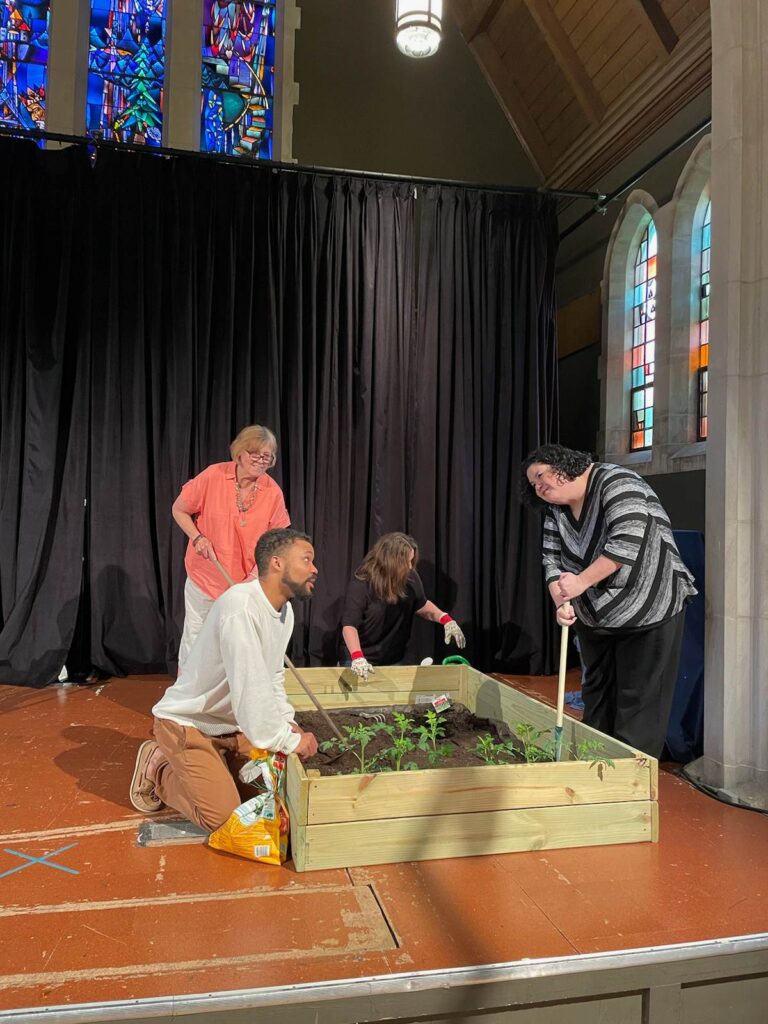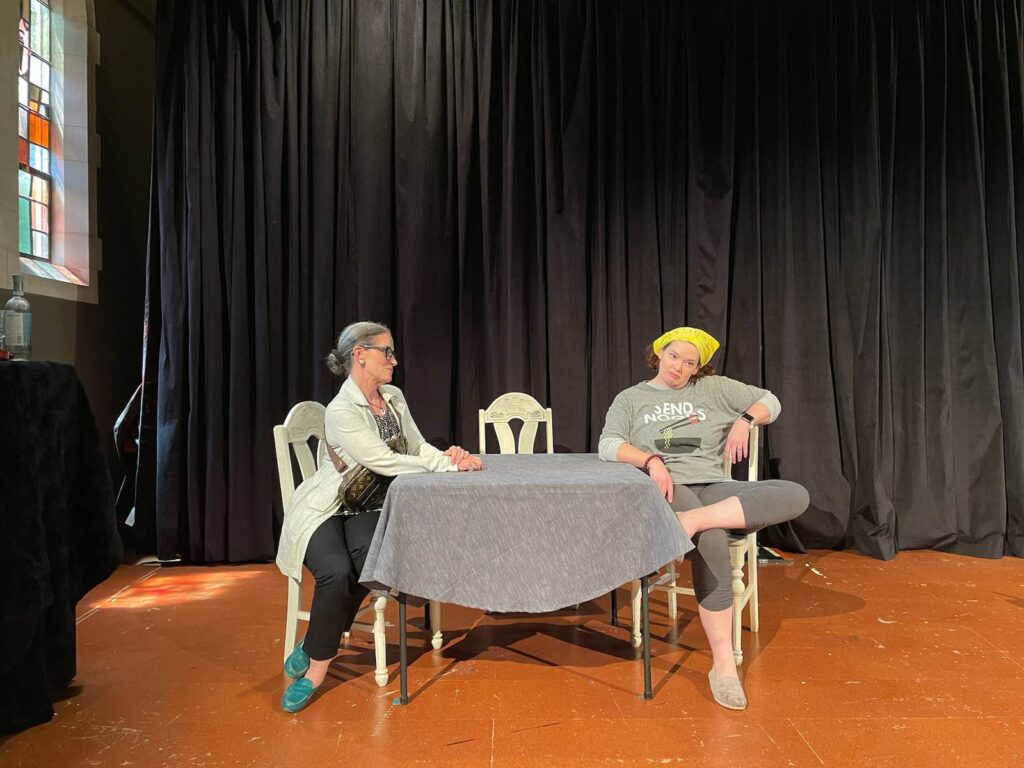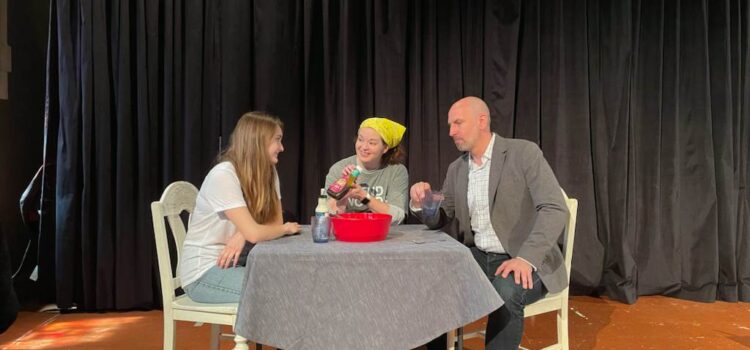By Lynn Venhaus
“From the Garden” is a clever topical one-act play that deserves to be seen. Its brief weekend run revealed a local writer’s biting wit and sharp observations that were realized by a zealous cast.
Whip-smart playwright Donald C. Miller directed his own show earlier this month (May 5-7) for four performances at the intimate venue, The Chapel, a modest production by Wee Laddie Theatrics.
It may have been staged on a shoestring budget, but the satire had big ideas and pointed barbs delivered by a taut ensemble of veteran performers, whose natural abilities carried over the message.
The three sold-out and one near-capacity matinee crowds got the jokes, so merry laughter ensued. Whether or not you know the real-life community conflict that sparked Miller to put pen to paper, tongue firmly in cheek in this “work of fiction,” you’ll mull over the points he’s making that are far from heavy-handed.
This is not a preachy diatribe about well-meaning citizens whose self-righteous stances can derail compassionate acts for ‘the greater good.’ It’s far more insightful about hypocrisy and personal agendas, pegging the democratic divide between old-school liberals and uberleft progressives.
And how some decent folks who want to avoid drama in their daily lives are unwittingly caught up in the maelstrom. And made very uncomfortable by those purporting to know what’s best for everyone.
We are familiar with the modern political climate of loud extremists, the right and left often far apart and unwilling to compromise or work together. It’s not just at the national and state level, but in our fair city’s distinct neighborhoods – and lines are drawn between left and far-left in the Democratic Party (and right and far-right in Republican circles).
This is an ‘across the aisle’ situation, only it’s set in an outdoor community garden tended to by neighbors and civic-minded people.
You’ll be able to recognize numerous characters as the cast nails the nimble wordplay. They are playing relatable people, not overly complicated roles.

Playing against type, Ann Hier Brown is amusingly annoying as Lisbeth Stanton, an upper middle class urban housewife that has cultivated an activist-advocate persona through curated social media posts.
She considers herself a feminist but is not seeking equality, for she is a control-freak do-gooder. As the comedic melodrama unfolds, she agitates her neighbors who want to get involved but eventually are put off by her sanctimonious lectures – and her assortment of chic bandanas. She is not above escalating conflicts for her personal gain.
It’s no coincidence her name resembles the great woman’s suffragette Elizabeth Cady Stanton. Miller is not anti-women’s rights at all, just pointing out how some folks take charge and then play martyrs or victims when they don’t get their way.
He provides more Easter Eggs, for other characters are given the last names of Nixon, Carter, Monroe and Ford. Ring a bell?
Funny guy Jason Meyers plays her husband Kirk, who tries to be supportive but is often a referee between mother and daughter. Teenager Emmy, conveyed by Nadja Kapetanovich in a defiant and questioning way, is like oil and water with her mom, who gets snippy and defensive in interactions.
Lisbeth also tussles with her no-nonsense natty mom, Sylvia Ford, played shrewdly by Margeau Steinau. Sylvia, with a deep pocketbook, travels in important circles and is organizing a benefit that Lisbeth is loath to attend.
Donald Kidd is well-suited to play Dwayne Jenkins, a committed activist who is running for the city council, but Lisbeth attempts to pull the strings and back another candidate. Rut-ro.
Neighbors who want to make a difference, but not necessarily get into a toxic situation, include Mara Bollini as Kate Carter, Camille Elena Fensterman as Xiomara Monroe, and Brenda Morrison as Ruth Nixon. They toss off snappy remarks with ease – and can spot a Karen lurking on the tree-lined streets – and don’t buy the disingenuous Lisbeth’s savior schtick.
Calvin Chambers was the technical coordinator and stage manager Ann Rapko.
The scenes are divided into soil preparation, weed prevention, watering and care, infestation, harvest, and dormancy. Of course, these are structured so that people can read between the lines.
The scene changes were a tad cumbersome, given the short time-length and the small performance space. But the sets were simple, reflecting the low-budget labor of love.
Nevertheless, small technical issues – like some performers being easier to hear than others – would be worked out in an encore presentation.
Hopefully, the play will have some staying power and there will be an opportunity for more theatergoers to enjoy it. Because an examination of identity politics is a good thing, exposing how unproductive it can be.
For background on playwright motivation, read this article in the Riverfront Times:
Because after all, not conforming and speaking out instead is always the preferable way to go, especially someone as skilled as Miller in expressing himself. In “From the Garden,” he mocks the obvious – and is not so subtle in a very funny way.

Cover Photo: Nadja Kapetanovich and Jason Meyers

Lynn (Zipfel) Venhaus has had a continuous byline in St. Louis metro region publications since 1978. She writes features and news for Belleville News-Democrat and contributes to St. Louis magazine and other publications.
She is a Rotten Tomatoes-approved film critic, currently reviews films for Webster-Kirkwood Times and KTRS Radio, covers entertainment for PopLifeSTL.com and co-hosts podcast PopLifeSTL.com…Presents.
She is a member of Critics Choice Association, where she serves on the women’s and marketing committees; Alliance of Women Film Journalists; and on the board of the St. Louis Film Critics Association. She is a founding and board member of the St. Louis Theater Circle.
She is retired from teaching journalism/media as an adjunct college instructor.

